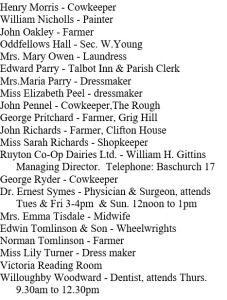
 |
Like Rome, Ruyton-XI-Towns lies on a river winding its
way among its seven hills. The river, of
course, is not the Tiber, but the Perry, which having left the marshy flats of
Baggy Moor, plunges its winding way among a series of hills to join the Severn
near Bromley Forge at Mytton.
I came to work in Ruyton in 1926. Having just left school, I had a year to fill
in before going to University.
Accordingly, I applied to the Shropshire Education Authority for a
temporary post as a student-teacher. I
was duly appointed to Ruyton C. of E. School at the princely salary of £30 per
annum. In due course I presented myself at the school to Mr.
W.A. Riddlesworth, the Headmaster. The
other staff were Mrs. Riddlesworth, Mrs. Challenor and Miss Glover. Mr. Riddlesworth not only gave a good example
himself on how to teach but his advice and criticism of my efforts were most
constructive. I will draw a veil over
some of the gaffs I perpetrated. Suffice it to say many of them would have provided
excellent material for that comic schoolmaster, Will Hay. I did notice however, that far from earning
the ridicule of the pupils, I gained their sympathy in being a fellow victim of
authority. Mr. Riddlesworth had high ideals on the role of the
schoolmaster in the life of the community and these ideals which he inculcated
into me I have never forgotten. He
carried these ideals with him into retirement by taking Holy Orders and
becoming Vicar of the neighbouring parish of Knockin.
I then began one of the busiest and fullest years of
my life. Mr. Riddlesworth was organist
and choirmaster at the parish church. So
he decided I should join the choir. As
my lately broken voice hardly gave an indication of what I was, he decided I
was a tenor. To help me along he placed
me beside the choir`s leading tenor, George Davies. Not only did this mean attending morning and evening service
on Sundays but choir practice on Friday nights.
After practices one adjourned to the Admiral Benbow across the road from
the church. In those days before radio and television became
paramount, communities had to provide their own entertainment and Ruyton was no
exception. On Mondays the village choral
society rehearsed in the Oddfellows Hall. (now the village hall) As Mr.
Riddlesworth was its conductor, I was duly conscripted to join. So most of that winter we practiced a wide repertoire,
ending with a public performance early in the New Year. That over, the Society gathered to prepare an
offering for Easter. At Easter 1927 the
Society performed Maunder`s `Pardon, Penitence and Peace` in the parish church.
On Wednesdays the village dramatic society
rehearsed. Again, I was
conscripted. The play was Sarah Grundy`s
`A Pair of Spectacles`. I played the
part of a hardup law student with a mean and harsh father – played by Mr. Hall,
a local poultry breeder, noted for his `silkies`. Mr. Riddlesworth enacted the role of my benign
uncle. The
producer was the Rev. Owen,
the Congregational Minister, who bullied or cajoled us to a final
production. One day I was accosted by my `dramatic father`
Mr.
Hall, who asked me to take part in a play he was producing for the
Junior
Imperial League. This was the `Young
Person in Pink` in which I played the part of a keeper in Hyde Park. The rehearsals were on Tuesday nights. The `Junior Imps` production went on first. Never shall I forget its aftermath. The criticism of the Rev. Owen of my role was
devastating. Every lunchtime I crossed
from the School to the Manse for practice in my other role until every gesture
and tone of voice was perfect.
Nevertheless, I was grateful to Mr. Owen for his training, particularly
in later years when I was a producer myself.
On Thursday evenings a discussion group was held at
the home of the Misses Kenyon. That year
the book for discussion was `The Clash of Colour` by Basil Matthews. Strange that half a century ago there was a
group in Ruyton studying the racial problems which affect our own country
today. Thus, in those days a Shropshire village could be a
hive of spontaneous activity, not yet dulled by the artificiality of the
cinema, radio and T.V.
Remote though Ruyton was over 50 years ago it had a
vigorous community life.
Charles Wilkes 1980
Kelly`s
Trade Directory for 1926, the year that Charles Wilkes was living in Ruyton XI
Towns, gives us a comprehensive view of the village community.
 |
 |
 |
 |
||
| Mrs & Mr Riddlesworth and teachers, Miss Parry, Miss Picken and Miss Morgan |